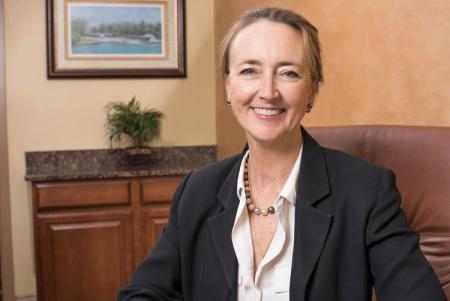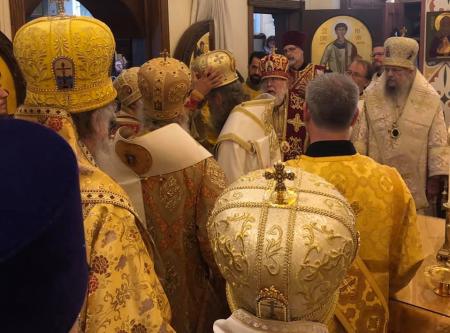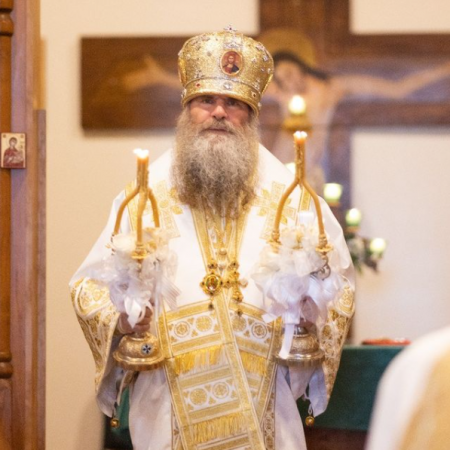Anne van den Berg's 'gift that keeps on giving'

Anne van den Berg is an attorney at the law firm of Marchena and Graham, P.A. in Orlando, FL. Born in Paris, France, Anne and her husband Egerton, a board-certified cardiologist with Orlando Health Heart & Vascular Institute, have lived in Central Florida since 1989. Their growing family includes six children and three young grandchildren, and they are active in their OCA parish, St. Stephen the Protomartyr in Orlando/Longwood.
For nearly twenty-five years, Anne served as a St. Vladimir’s Seminary trustee, chairing the Advancement and Trusteeship Committees and contributing her expertise within the Legal Affairs Committee. When she retired from the Board in 2015, Seminary President Fr. Chad Hatfield commended her “for bringing her professional and legal perspective to our SVOTS Board.”
One of Anne’s law practice concentrations is in the area of wills and trusts, and in our Zoom conversation we spoke about how she has established a planned gift to St. Vladimir’s Seminary through the Father Alexander Schmemann Legacy Society.
Seminary welcomes Doctor of Ministry students, new professor to campus

The newest Doctor of Ministry (D.Min.) Cohort has been together for nearly a year without being able to meet in person. That changed this month. Members of the Cohort of 2023—who held their first intensive last fall via Zoom due to the pandemic—arrived on campus for their onsite intensive component July 12 through 16, 2021.
“It has been a blessing to be a part of the D.Min. program at St. Vladimir’s. Within a short time it has already enhanced my ministry a great deal,” said Fr. Sean Govostes, who serves at St. Katherine Greek Orthodox Church in Burlington, NC. “Being on campus for intensive week was very fruitful and beneficial for the entire cohort, if I may speak for us all. I would recommend the program to any priest who desires to better himself and enhance his parish.”
Joining Fr. Sean and the other D.Min. students on campus were Seminary professors Very Rev. Dr. Nicholas Solak and Dr. Ana Iltis. They taught Counseling in the Parish and Bioethics for Ministry, respectively. Professor Iltis is part of a group of noted professors who recently joined the D.Min. program, and the onsite intensive this month marked her first official visit to St. Vladimir’s in a teaching capacity.
“The onsite intensive lived up to its name in every way,” said Dr. Iltis. “Students and faculty were able to gather onsite at the seminary, and we enjoyed an intense week of exploring many of the ways bioethics issues relate to ministry.
“Witnessing the deep commitment the D.Min. students to advance their ministry was inspiring.”
The Cohort of 2023, the fourth that has formed since the D.Min. program was revived in 2014, was originally comprised of ten students from six different jurisdictions and denominations. Due to pandemic-related and other circumstances, a few students had to take leave from the program over the past year. The remaining students of the 2023 cohort are all priests who serve in parish ministry.
The D.Min. program at St. Vladimir’s Seminary provides priests, chaplains, and other pastoral professionals with advanced knowledge and skills. The program’s hybrid format allows students to continue serving in their current pastoral ministry while completing their D.Min. degree. For more information about the D.Min. program at St. Vladimir’s, contact Program Director Very Rev. Dr. Sergius Halvorsen at shalvorsen@svots.edu.
St Vladimir's Education Day Online
Are the Old and New Testaments in conflict? How do Orthodox Christians respond to matters of bioethics in a secular age? What is the future of Orthodox evangelism? Ask a scholar! Tackle these questions and others on a variety of topics during St. Vladimir's Education Day Online, a seven-hour “Zoomathon” where you get to participate and pose questions to Seminary professors and guest scholars.

The St. Vladimir’s Education Day Online—in celebration of the Feast of Holy Great Prince Vladimir—is Saturday, July 17 from 10 a.m. to 5 p.m. EDT (7 a.m. to 2 p.m. PDT). Participate in discussions and win prizes. Join the Zoomathon when a topic that interests you is scheduled, or join several discussions throughout the day. It's up to you when you join and for how long. (See the complete schedule below.)
Join us and help raise $40,000 to educate seminarians! Attendance is FREE. Please consider making a donation as you register or during the event. (If donating through our Giving Page, please select "St. Vladimir's Education Day Online" in the I want to support menu.)
You may submit questions now, as you register, to be asked during the event on July 17 (please indicate what topic your question belongs to in the comment box). Of course, you will be able to ask questions live during the event as well.
Faculty members from St. Vladimir’s Seminary will be joined by Seminary Alumnus Archbishop Alexander (Golitzin) and SVS Press author Archpriest Joseph Huneycutt. See below for a complete list along with a schedule of topics for the day.
Schedule of Topics & Scholars
|
TIME (EDT) |
TOPIC |
SCHOLARS |
|
10am |
Welcome & Opening Remarks |
|
|
10:15am |
Theophaneia: Forum on the Jewish Roots |
|
|
11:15am |
The Legacy of Fr. Alexander Schmemann |
|
|
12:05pm |
Orthodoxy After Communism |
|
|
1:05pm |
An Orthodox Response to Secularism: How Orthodox Christians respond to matters of bioethics in a culture "after God". |
|
|
2:05pm |
The Relationship of the Old & New Testaments |
|
|
3:05pm |
COVID-19 & Orthodox Seekers |
Very Rev. Dr. Chad Hatfield |
|
4:05pm |
Creativity & Holiness |
|
|
5pm |
Closing Remarks |
St Vladimir’s Seminary earns renewed accreditation status

St Vladimir's Seminary in Water Color, by David Lucs
The Association of Theological Schools (ATS) has officially reaffirmed the accreditation status of St. Vladimir’s Orthodox Theological Seminary (SVOTS). The Seminary’s accreditation, which had been set to expire in 2021, is now approved through July of 2028.
The official ATS accreditation report was overwhelmingly positive and affirmed the Seminary’s current strengths, notably an emphasis on a “life of formation,” its pan- and inter-Orthodox diversity, and a commitment by the administration and faculty to a mission-based and communication-oriented culture.
“This is high praise that verifies St. Vladimir’s Seminary is uniquely positioned to best prepare our future pastors and leaders to advance the Good News,” said Seminary President Very Rev. Dr. Chad Hatfield. “The accreditation process and ATS’s feedback also gave us opportunity to reflect on areas to strengthen and what we must do moving forward in service of Christ and His Church.”
The reaffirmation of SVOTS’ accreditation followed a comprehensive evaluation visit by a delegation from ATS in the spring of 2021. From April 12–15, representatives from the ATS Commission on Accreditation (COA) virtually visited St. Vladimir’s Seminary in order to verify that the Seminary met all applicable Commission Standards of Accreditation. At the same time the COA Board voted to reaffirm accreditation, it also authorized a follow-up, onsite-focused visit to the school when safe and reasonable to do so, in order to meet normal requirements for an onsite evaluation that could not be met via remote visit.
“We are thankful to ATS for their thorough consideration of the strengths, weaknesses, and enduring vision of St. Vladimir’s Seminary,” said SVOTS Academic Dean Dr. Ionuț-Alexandru Tudorie. “I am also particularly grateful to my many colleagues at the Seminary who made important contributions to the success of this process!”
Saint Vladimir’s has been accredited by ATS since 1973, and is currently “Accredited in Good Standing,” meaning the school meets all applicable COA Standards of Accreditation. According to ATS, "The school demonstrates educational quality and financial stability and provides evidence that its student learning outcomes are appropriate, rigorous, and being achieved. The Seminary also has no public sanctions (notation/warning, probation, or show cause), and is approved to offer four degrees: Doctor of Ministry (D.Min.), Master of Divinity (M.Div.), Master of Arts (M.A.), and Master of Theology (Th.M.)."
Alumnus consecrated as Bishop Gerasim of Fort Worth

On Tuesday, June 29, 2021, bishops of the Orthodox Church in America (OCA) gathered at St. Seraphim Cathedral in Dallas, TX for the consecration to the Holy Episcopate of Bishop-elect Gerasim (Eliel) to be the bishop of Fort Worth, auxiliary to Archbishop Alexander and the Diocese of the South. Many alumni and faculty from St. Vladimir's Seminary were present, including St. Vladimir's Seminary President Archpriest Chad Hatfield and Professor Dr. Vitaly Permiakov.
On the eve of the consecration, before the Great Vespers for the feast of Ss. Peter and Paul, His Beatitude Metropolitan Tikhon, together with the gathered bishops, celebrated the Nomination and Proclamation of a Bishop, which began with Archpriest Alexander Rentel, chancellor of the Orthodox Church in America, reading the official announcement of the election. In his acceptance, Bishop-elect Gerasim reflected on responding to the call of God in the Church. Quoting the final matinal psalm, he expressed his desire to know “the way in which to walk,” not only for himself but for the faithful of the Diocese. He closed asking for the guidance of the bishops in exercising his new episcopal ministry. Bishop-elect Gerasim then celebrated the Great Vespers service.

Gathering on the morning of June 29, concelebrating the Primatial Divine Liturgy led by His Beatitude Metropolitan Tikhon were His Eminence Metropolitan Isaiah of Nikozi and Tskhinvali (Georgian Orthodox Church); His Eminence Archbishop Benjamin of San Francisco and the West; His Eminence Archbishop Melchisedek of Pittsburgh and Western Pennsylvania; His Eminence Archbishop Alexander of Dallas, the South and the Bulgarian Diocese; His Eminence Archbishop Paul of Chicago and the Midwest; His Grace Bishop Daniel of Santa Rosa, Auxiliary to the Diocese of San Francisco and the West; His Grace Bishop James of Sonora, Second Vicar of the Western American Diocese (Russian Orthodox Church Outside of Russia); and His Grace Bishop Andrei of Cleveland, Auxiliary to the Romanian Orthodox Episcopate of America.
Before the beginning of the Divine Liturgy commemorating Ss. Peter and Paul, Bishop-elect Gerasim offered his statement of faith, proclaiming the Nicene-Constantinopolitan Creed, and offered a detailed explanation of the Church’s Trinitarian and Christological doctrines in the presence of Metropolitan Tikhon and the assembled hierarchs, clergy, and faithful. He pledged his commitment to uphold the Church’s canons and the teachings of the Holy Fathers and to preserve unity with his brother bishops.
During the Divine Liturgy, before the Little Entrance, awards were granted to numerous priests of the Diocese of the South by Metropolitan Tikhon on behalf of the Holy Synod and Archbishop Alexander. In addition to Archpriest Paul Yerger receiving the right to wear the mitre, in honor of his almost 44 years of service in the priesthood, Archpriests Thomas Moore (St. Vladimir's Seminary class of '99), Stephen Freeman, and Marcus Burch ('97) were awarded the jeweled cross; Hieromonk Arkady (Migunov) was raised to the rank of Igumen; Priests John Mikita, Nikolay Miletkov ('06), and Basil Biberdorf ('05) were raised to the rank of Archpriest; Priest John Cox ('11) was awarded the gold cross; Protodeacon Steven Kroll was awarded the right to wear the kamilavka; and Deacons Theophan Warren and Gregory Conley were raised to the rank of Protodeacon.
During the singing of the Trisagion at the Divine Liturgy, Archpriest Alexander Rentel, chancellor of the Orthodox Church in America, and Archpriest Marcus Burch, chancellor of the Diocese of the South, presented Bishop-elect Gerasim to the bishops in the altar for consecration.
In his homily, Metropolitan Tikhon emphasized the centrality of the apostolic teaching of Saints Peter and Paul, that God revealed Himself to us in the person of Jesus Christ, and that the apostolic mission is to bring all peoples and all nations to faith in the one God and Father. His Beatitude charged everyone to imitate the pattern of the apostles as revealed in their writings, that our faith would lead to knowledge, and knowledge to greater faith.
During the Divine Liturgy, the newly consecrated Bishop Gerasim ordained Deacon Jeremiah McKemy to the Holy Priesthood and Subdeacon Theophan Alvarez to the Holy Diaconate.
At the conclusion of the Divine Liturgy, Metropolitan Tikhon welcomed all those assembled and thanked the gathered bishops, especially welcoming the guest bishops from the Georgian Orthodox Church and the Russian Orthodox Church Outside of Russia. Finally, he congratulated the newly consecrated Bishop Gerasim and exhorted him to always remember to show mercy, consolation, and kindness to the flock of the Diocese of the South. He charged him to work in unity with Archbishop Alexander and all the bishops and faithful of the diocese in order to build up the work of the Church [Read the full text here]. With those words, he presented the Archpastoral Staff to Bishop Gerasim. Bishop Gerasim then ascended the cathedra to bless the gathered clergy and faithful.
Leading up to His Grace's consecration as bishop of Fort Worth, Bishop Gerasim had been serving as rector of St. Seraphim of Sarov Cathedral in Dallas, TX, administrator of the Diocese of the South Diocesan Council, and dean of the Diocese’s Southcentral Deanery.
Bishop Gerasim graduated from St. Vladimir’s Seminary with a Master of Divinity degree in 2012. He was the class valedictorian and also received commendations for contribution to community life and for his thesis, Russian Icons in a Native Church: Conflict in Culture in Western Alaska.
The St. Vladimir's Seminary community wishes the newly ordained Bishop Gerasim many years! AXIOS!
Commencement, Spring 2022
(All students on campus)
Last day for completing all work within the semester
(5 pm deadline)
Last day for May graduates to complete all degree requirements
(5 pm deadline)
